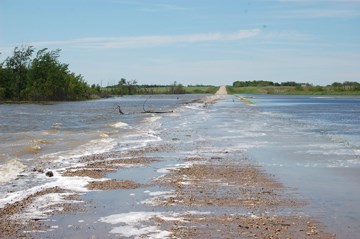The SWA has complied with a federal order, but has decided to challenge the order in federal court.Early last month, Environment Canada issued an order to the Saskatchewan Watershed Authority (SWA) to stop the water flow between two lakes. On May 10, an Inspector's Direction under the Federal Fisheries Act was issued to the SWA, ordering it to close the culvert under Grid 777, stopping the flow of water from Houghton Lake to Lenore Lake. The order was issued to protect the fish in Lenore Lake.The SWA is continuing to comply with the order, but is challenging it because constitutionally, the drainage and containment of water is a provincial responsibility, explained Wayne Dybvig with the SWA."The Watershed Authority has complied with this legal order from the Government of Canada, but we believe that the order holds a number of implications that can impact our ability, and our right, to manage our own water," said Nancy Heppner, Minister responsible for the SWA. "Therefore, the Watershed Authority will challenge this directive in Federal Court."The Fisheries Act says that the federal government controls the discharge of deleterious substances into water, but identifying naturally occurring saline water as a deleterious substance is not appropriate, said Dybvig.The province filed its challenge in federal court on June 10, and now the federal government has 30 days to develop a response, Dybvig said.Sometime over the next three months, Dybvig expects the federal court to sit in Saskatoon and listen to both sides present their case. They will issue a decision after that. Until a decision is issued by the court, the SWA will continue to comply with the order."This has huge implications for future water management in the province," Dybvig said. "We don't think the (Fisheries) Act has been applied this way before. We're concerned about this situation and possible future situations."The SWA operates under the principles of integrated water management, which means taking a broad view and considering multiple issues when making decisions. This approach is not reflected in the federal directive, in which no consideration is given to related issues such as upstream flooding or cost implications, the SWA believes.Even if the federal court decides in favour of the SWA, they would still have to assess the situation at that time and decide how to proceed, Dybvig explained."We are still looking at long-term options and we are still negotiating with landowners," Dybvig said. "We are continuing to work with the Lake Lenore Planning Committee to find solutions."In the short term, the SWA will continue to work on a dyke to prevent water from Deadmoose Lake flowing back into Waldsea Lake, and on turning Grid 777 into a dam to prevent water flow between Houghton Lake and Lenore Lake.Batoche MLA Delbert Kirsch said even though the province is challenging the federal order, all the groups involved still have to sit down together and find a solution."We need to find solutions now," he said. "It's not just a case of fish or farmland. It's more intricate than that."Kirsch says he's been working on the issue for seven years and doesn't see any easy solutions to the problem.




